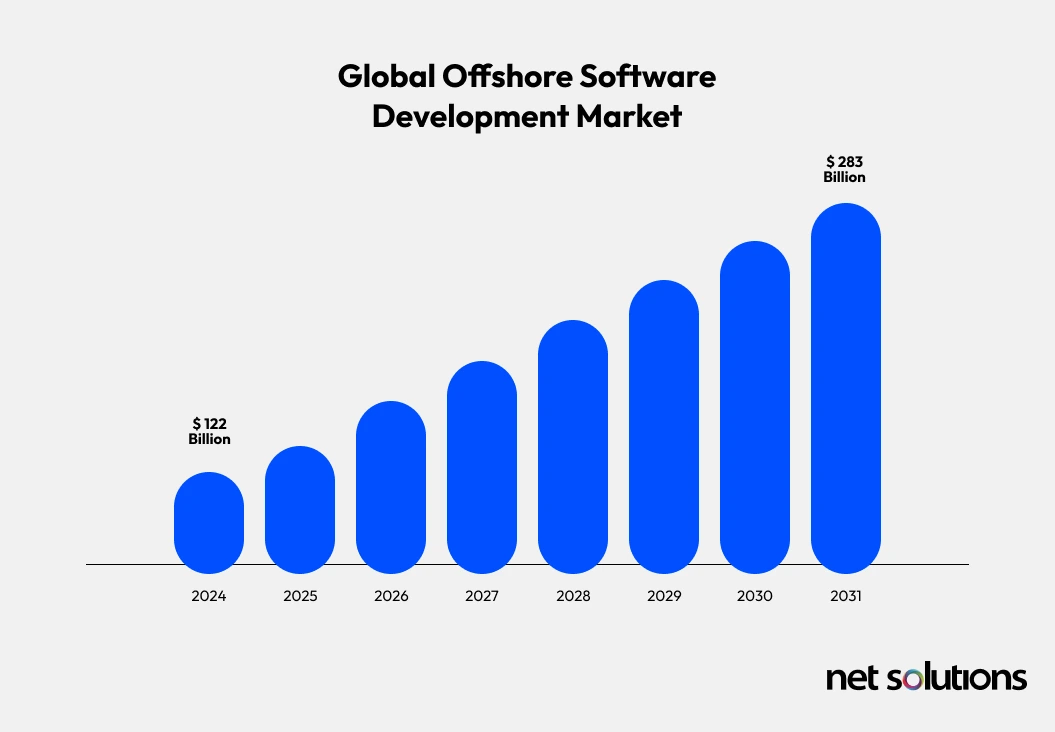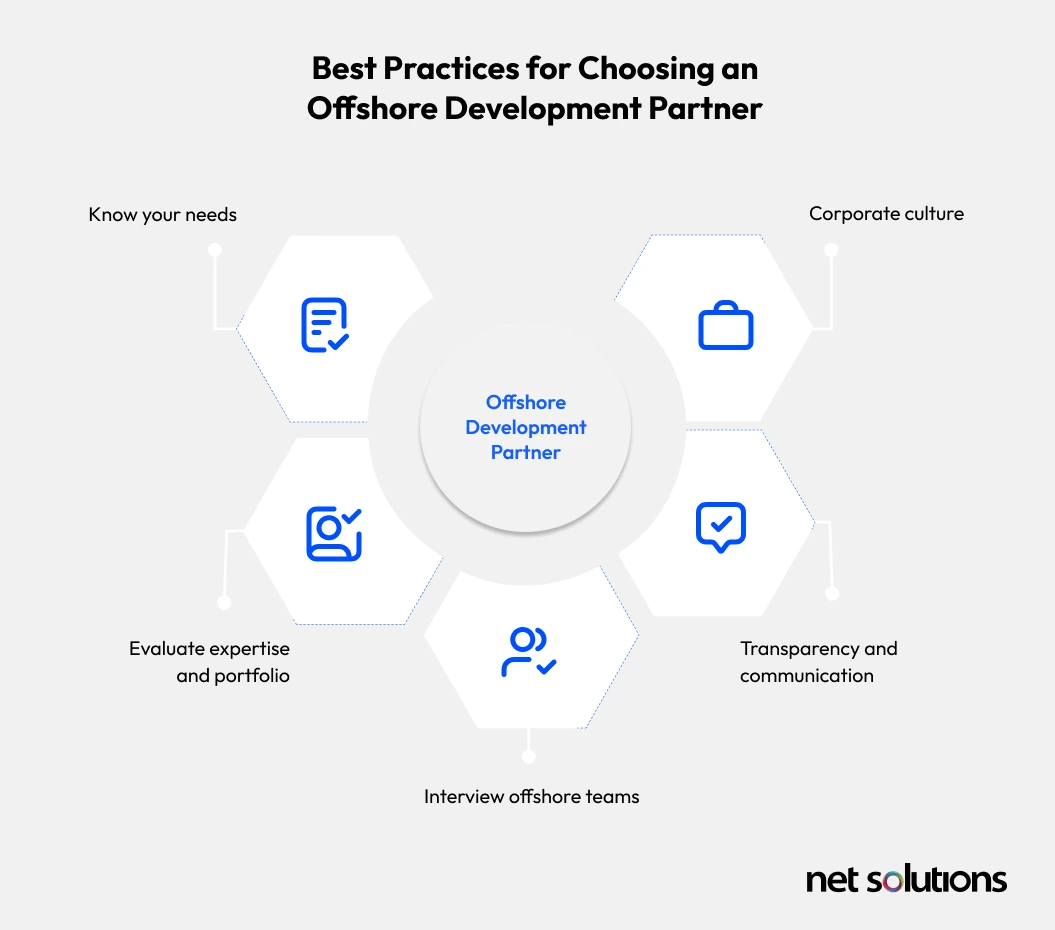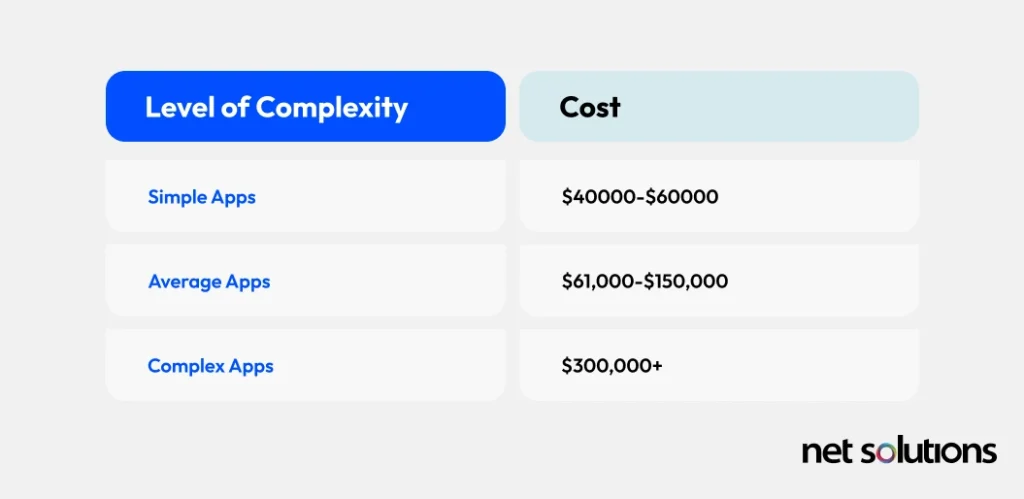Over $122 billion was estimated to be spent on offshore software development, a figure set to increase to $283 billion (USD) by 2031, according to Verified Market Research.

The reason for the growth of offshore development is simple: it’s a cost-effective way for organizations to scale their operations by tapping into the skills and experience of teams in an out-of-country location, often helping organizations realize their goals faster and with high rates of success. In fact, it’s more than likely that many of the apps you use and love today were created by offshore teams.
Launch Fast with MVP Development
Validate your ideas quickly with an MVP that accelerates market entry. We deliver functional MVPs that gather insights and reduce risk, helping you launch faster with a focused, agile approach.
What Is Offshore Mobile App Development?
Offshore development (offshoring) is the process of outsourcing or contracting work to ‘overseas’ or out-of-country individuals or development agencies. Offshoring can be a solution to support individual projects, like mobile apps, or as a permanent supplement to support internal IT staff.
To realize the highest returns, offshore mobile app development involves contracting with agencies to help you ideate, design and develop your mobile application(s), leveraging their team of in-house experts to help realize your project in record time.
whether it’s a mobile eCommerce app or B2B eCommerce app, eLearning platform, patient portal, news or lifestyle circular, sports app, game, or an app to support the efficiency and productivity of your employees (e.g. internal communication or field work support). There are no limits to how organizations are supporting the digital experiences of their customers, employees, and partners.
Why Should You Consider Offshore Mobile App Development?
Offshore mobile app development can help your business realize significant efficiencies (sometimes up to 40% over local development), unlock agility, and scale in response to emerging opportunities. Offshore development is a strategic decision to help you build a high-quality, secure app in record time.

Cost efficiency: Many countries that specialize in offshore development, such as India, have countries with lower wages that are commensurate with a lower cost of living. Further, offshore partners have built up processes, tools, and teams that work well together with experts working within their niche to realize their potential. These organizations often have lower overhead as well. All these savings can be passed on to you.
Access to global talent: While many Western countries, particularly the United States, are experiencing an IT skills shortage, that gap can be filled by working with a global talent pool of architects, engineers, developers and designers who are familiar with the latest trends and innovations and are experts in mobile app development.
Faster time-to-market: With experts in mobile app development, a scalable talent pool, flexible development hours and established processes, you can realize your project in a fraction of the time—all critical if you’re trying to remain competitive by launching an app in response to a time-sensitive opportunity, to resolve complaints about having only an iOS or Android app instead of both platforms, or to help cut costs with an app designed to realize continuous operational efficiencies.
What Are the Key Benefits of Offshore Mobile App Development Agencies?
Experienced offshore development agencies bring a wealth of experience to the table, not just in platforms (e.g. iOS, Android, cross-platform) and innovative technologies (AR/VR, AI), but in hours spent building mobile apps. While you may be an expert in your business and your customers, and may have very skilled IT teams supporting you, your business is not mobile app development. If it was, you wouldn’t be outsourcing.
Offshop mobile app development agencies are experts in turning ideas into apps. They bring tangible experience to the table to help create innovative apps in record time. The ideal offshore agency will also offer:
1. A 24/7 development cycle
Although there is the perception that you will be working asynchronously with your offshore partner, many partners have established routines that allow them to both work in your preferred time zone, to support real-time communication, and to offer 24/7 development with a team of rotating developers to help accelerate your development cycle. This level of acceleration is not always needed, but it can be critical for some business situations.
2. Flexibility in scaling
Offshore development can come in all shapes and sizes. You could work with an individual or a small agency, but you will realize the highest returns by working with larger agencies. These large agencies will have full and part-time employees with a wide range of skills, allowing the agency to scale teams quickly based on project needs.
Your offshore partner offers a cost-effective approach to scale your business.
The long term advantage of a flexible talent pool: Working with an offshore partner long-term allows you to tap instantly into a flexible talent pool that can scale up or down per your needs of the moment. Think of the operational efficiencies and cost savings versus the months of job postings and interviews to hire internally.
3. Technology and industry-specific expertise
There are many approaches to mobile app development, with decisions extending beyond solely the platform you choose Native application development (iOS, Android) or cross-platform.
It is critical to have expertise across a variety of mobile development frameworks (React Native, Flutter, Ionic, Xamarin), languages (Swift, C++, Java), third-party libraries, and APIs to be able to integrate the app within your overall tech stack, as necessary. Access to emerging technologies like AI, AR (augmented reality), VR (virtual reality), and emerging security technologies (e.g. passkeys) can help you keep ahead of mobile app development trends.
While in this guide we are speaking specific to mobile app development, and looking at mobile app technologies, your ideal offshore partner can offer you long-term support—to maintain and improve your app, but also to upgrade your tech stack, improve operational efficiencies, launch new websites, or to assist your company as it grows into new business lines and markets.
What Are the Potential Challenges and Risks and How Can You Overcome Them?
While there are many benefits to working with an offshore partner for application development, and software development in general, there are some potential challenges and risks in the endeavor. In this section, we will address these possible challenges and provide solutions to help you navigate a successful partnership.
1. Communication barriers
When working with out-of-country teams, there is the potential for language and cultural differences or misunderstandings that could be attributed to unclear communication.
Solution: Carefully research your offshore partner to understand their strengths and weaknesses in communication. Ask for communication guidelines and establish regular check-ins during the progress to avoid potential misunderstandings. Development teams that follow an Agile or Agile Scrum approach will incorporate regular feedback to help identify areas for improvements or needed scope changes.
2. Time zone differences
When working with a partner outside your own country, and potentially overseas, there is the potential for challenges associated with different time zones. Asynchronous communication can delay critical feedback or decision making in the development process and difficulties in scheduling meetings may slow down time-to-market.
Solution: Leverage a partner with offshore teams with flexible scheduling, work within your timezone for real-time communication, and/or hybrid teams with project staff in your local time zone. Ensure you have project management tools to track tasks and communication so that nothing gets overlooked in chats or email.
3. Intellectual property concerns
When you work with an offshore partner, they will have access to sensitive information about your organization and its plans and proprietary data, including the source code they develop for you, raising intellectual property (IP) concerns. Many countries also have legal protections related to IP and copyright.
Solution: Ensure you have worked with a lawyer to draw up appropriate legal contracts and NDAs and that the agency you work with is taking appropriate steps to safeguard your data and IP against intrusion by using strong multi-factor authentication, encryption, secure code signing and other measures.
4. Quality control issues
If you outsource your project, in some ways you are ceding control to another team. That will always raise fears related to quality control. Not all outsourcing partners are created equal and there is the potential your partner will create a product that either does not meet your expectations or that has an unexpected number of bugs or usability issues.
Solution: Carefully research your partner or offshore vendor before you begin, asking for development methodologies and standards, team composition, and qualifications (particularly for security). Build quality standards into your contract and ensure your plan includes regular updates, code reviews, and iterative testing, allowing you to evaluate for quality output.
The role of bias and fear in outsourcing
The public perception of outsourcing has been heavily influenced by both negative representation in popular culture and some level of bias. There may be a perception that outsourced staff in South Asian or Eastern European countries are not as skilled as those Western countries, or that their English language skills will be sub-par. There may also be fear from internal IT staff that outsourced staff will ‘replace’ their jobs. It is critical to question these assumptions and address concerns before embarking on your outsourcing project.
5. Security and privacy
Software is increasingly subject to compliance requirements around data security and privacy. Overseas teams may not be aware of or understand the complexities of regulations in the region(s) or industries in which you operate. Further, some offshore development agencies may focus on speed over quality, as noted above, which could mean cutting corners on implementing more time-consuming security features.
Solution: Security is a shared responsibility, so have a clear understanding of your requirements, which include those for every state / country / industry in which you operate. Include security requirements in your initial conversations with potential partners as it pertains to both features (e.g. multi-factor authentication or passkey support) and expected security testing. For heavily-regulated industries, look for agencies who can supply certification that attests to strong practices (e.g. ISO/IEC 27001).
How Do You Choose the Right Offshore Development Partner?

When it comes to offshore development, not all development partners are created equal. Having worked with thousands of clients, here are some of the criteria our clients have used to evaluate potential partners:
1. Know your needs
If you’re reading this post, you likely already know you need a mobile app. But what do you need a mobile app for? What goals are you hoping to achieve? Having some of this thought out can be helpful in evaluating potential app development partners.
2. Evaluate expertise and portfolio
Evaluate the clients and success stories shared on the development partner’s website. While public case studies are a great first pass, some case studies may be gated or available only upon request. Consider asking the potential partner for a more comprehensive list of clients to evaluate:
- Expertise in a specific industry. Are they brands you recognize?
- Expertise in a mobile app development
- Links to completed projects, if available for public consumption
- Links to projects in the mobile platform you’re evaluating
- How to get started
Don’t be afraid to reach out to the offshore agency directly and to speak with executive leadership.
Tip: You can also check out reviews for the partner on G2, Clutch or Techreviewers to see what customers and employees have to say about the company in question.
3. Interview offshore teams
When you first make contact with an offshore development agency, your initial point of contact will be with sales executives. While sales teams do a wonderful job of representing the development companies they work for, they don’t give you a sense of how it will be to work with an offshore team.
Consider interviewing an offshore project manager, as these individuals will be the primary point of contact between you and your offshore development team. Additionally, you’ll want to evaluate a breadth of expertise for your project, including:

| Strategy | Mobile application development | User experience (UX) design | Security | Quality & Assurance testing |
4. Transparency and communication
When it comes to transparency, this means having open lines of communication to know day-to-day or weekly the progress of your project, as well as transparency over the timeline and the budget. Less reputable agencies will extend timelines unnecessarily or require add-on fees to cover testing or post-launch support, all of which undermines the trust in the relationship.
The ideal partner should have flexibility in its pricing model to be able to accommodate clients of all sizes and their individual projects—there is no one-size-fits-all cost to build a mobile app, so be wary of partners who state otherwise (you’re probably being overcharged).
5. Corporate culture
Evaluate the history and vision of the company to help establish if they are a cultural fit for your organization.
How well the offshore partner attracts and retains staff can also be a good indication of corporate culture. To do this, look at third-party review sites such as Glassdoor. Employee reviews indicate what it’s like to work at the company and whether they feel valued as employees. Valued employees are more likely to take ownership over their work and its results.
What Are the Key Steps in Managing an Offshore App Development Project?
Once you sign an agreement to work with a specific offshore agency, it’s critical that you have insight on how the project will be managed, the approach to development, milestones, and all the available resources you have to stay abreast of the project and to communicate your feedback.

The most successful projects involve an ongoing level of collaboration between client and partner.
1. Setting clear goals and expectations
A reputable offshore development partner will have an established approach to project management that ensures clear communication, focus and efficiency. Your initial plan should lay out:
- The project goals: what you’d like to achieve with the app and any targets you’d like to reach with measurable goals (e.g. conversion rates).
- The project scope: An outline of your project idea or needs, to be further established during the ideation stage of the project.
- The ideation process: How the partner establishes what you and your target user need from the mobile app.
- Project priorities: Based upon the ideation process, set priorities for desired features of the app.
- Which software development methodologies are being used (Agile, Scrum, DevOps).
- Communication expectations: how often you will meet with project managers and how updates are communicated. Understand any timezone limitations and be clear if you expect teams to work in your time zone to support real-time communication.
- Collaboration: If the offshore partner will be working with your in-house team, how is communication managed and/or tasks shared.
- Project management fit: Have an introduction with your project manager to ensure there is a good fit, in terms of communication and working style.
- Target timeline: A general target for the completion of a minimum viable product (MVP).
2. Establishing milestones and timelines
While in general you will establish milestones and timelines early on in your relationship, the kinds of steps you want to see in an estimate or RFP (request for proposal) on the app development process include:
- A defined ideation phase: Helping visualize what you want, establishing the product backlog (all the things that you could want) and prioritizing those features into a minimum viable product (MVP).
- An exploration phase: Creating wireframes, designing architecture, ideading interfaces and/or prototypes.
- A development phase: Breaking down the product backlog into pieces (or “sprints”) can help establish milestones in the development phase
- A testing phase: While testing should be iterative within development, the plan should lay out final pre-launch testing for usability, security and performance.
- Post-launch support: This should be built into your estimate, to fix any bugs or performance issues post-launch.
3. Tools for project management and communication
As communication is essential to the efficiency of the development process, explore what options are available for communication and project management. The development agency should be flexible, either adopting your preferred platform (upon invitation to your platform) or providing you access to tools they already have in use such as Slack, Jira, Trello or Asana.
How Does Net Solutions Ensure Success in Offshore Mobile App Development?
For over 24 years, leading brands have trusted Net Solutions with their projects. We have helped bring over 3,000 ideas to life, including iOS, Android, cross-platform and web apps for clients such as Harvard Business Review, Appee, Haymarket Consumer Media, and Scoff.
We have offices in Chandigarh, New York, Toronto, and London, providing a hybrid nearshore and offshore approach to consultation and development that helps us provide our clients with closer and more efficient service. Our offshore teams work during and around your business hours to maximize real-time collaboration throughout the entire duration of the project, helping deliver exactly what our clients want.
1. Proven process and best practices
Since Net Solutions launched in 2000, we have grown to a team of 500 with offices around the world and proven experience launching over 3,000 projects. Our human-centric approach to development allows us to put you and your users first to create mobile apps and digital experiences that transform your business and accelerate your growth. Our commitment to quality and investing in the ongoing education of our staff has made us a reliable offshore partner, one that clients come back to again and again (even for over a decade!).
We are a full-service app development agency offering a structured and collaborative approach to mobile app development that can help us deliver a project MVP (minimum viable product) in as little as 8 to 10 weeks.
2. Expertise in delivering high-quality apps
Net Solutions boasts over 500 nearshore and offshore experts, with deep expertise in developing mobile apps for iOS, Android, cross-platform, and web apps and across a variety of industries including retail, automotive, education, food and beverage, healthcare, media and publishing and more.
Whether you are iterating an existing app onto another platform or you come to us with a fresh idea, our experience allows us to assess your specific needs, through discussion and customer research, and ensure we choose the right platform(s) for you.
Our team of experts includes skills can help your organization scale, with experience in:
- iOS, Android, cross-platform development
- UX/UI design
- Q&A
- Application performance optimization
- Application security
While our offshore teams leverage a Scrum-based Agile Development approach to drive an iterative, rapid approach to bringing your idea to life, our hybrid approach also allows us to tap into global talent pools in advanced skill sets in cutting-edge technologies such as artificial intelligence (AI).
Net Solutions offers a proven track record in offshore mobile app development with a focus on minimizing risks while maximizing outcomes. Our experience with global clients, deep technical expertise, and structured processes ensure that your app development project is in safe hands from start to finish.
Net solutions is ISO 9001:2015, ISO 27001:2013, PCI DSS, and TISAX certified and partners with leading tech providers (i.e., Microsoft Gold Certified Partner and AWS).
3. Real-world examples of successful projectss
As experts in digital transformation and custom software development, specializing in mobile app development and AI/ML integration, we have been the partner of choice for organizations large and small.

| A 96% in app conversions for Hancocks, the UK’s largest confectionery wholesaler | A mobile social platform for healthcare professionals meeting the highest security standards | An asset tracking app for Xerox launched in under one month |
For our eCommerce customers, Net Solutions averages an increase in client on-app conversions by over 65% within 7 weeks of going live.
“Net Solutions is our outsourcing partner. They really focus on customers and understand their business objectives. We’ve worked with them for over 10 years and they have really done an outstanding job for us. They consistently exceed our expectations despite being in separate time zones.”
— Sean Devlin, Founder, Front Rush
Ready to Start Your Project?
With a global footprint and commitment to excellence, we prioritize a human-centric approach to every mobile app development project, helping understand what you need and ensuring we bring the right experts to the job. Our job is to bring innovative project ideas to life. Will yours be next?
SHARE THIS POST
Table of Contents
Related Resources
- What is App Store Optimization (ASO)? The in-depth guide for 2024
- The Mobile App Architecture Guide for 2024
- 7-Step Mobile App Development Checklist (Free Download)
- How Much Does it Cost to Build an App [A Complete Breakdown]
- How To Protect Data In Mobile & Web Apps Using Encryption
- eCommerce Mobile App Development: A Step-by-Step Guide
- 7-Step Mobile App Development Checklist (Free Download)
- How Firebase is Emerging as an Innovation in App Development
- A Complete Guide to Implementing In-App Purchases
- Low-Cost Mobile App Development: A Comprehensive Guide
- How to Make an App in 2024: 5 Stages of Mobile App Development
- What is Mobile-first Design (+9 Best Practices)
- The Ultimate Guide for New App Ideas
- Most Popular Programming Languages for Mobile App Development
- The 7 Best Programming Languages to Write & Develop Native Android Apps
- 7 Mobile App Development Tips for Acquisition & Retention
- Top 15 Mobile App Development Trends to Watch for in 2024
- The Fundamentals of Android App Development: Basic Tutorial

